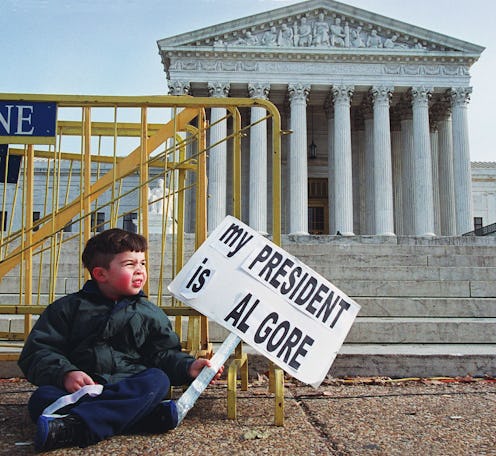News
Getting Rid Of The Electoral College Isn't Easy
The Electoral College has been the subject of debate since it was first implemented centuries ago, but when George W. Bush won the presidential election in 2000 despite Al Gore winning the popular vote, controversy surrounding the institution rose to a much more intense degree. To this day, people are still arguing that Al Gore was the real winner and debating whether the recount in Florida was accurate — the state whose electors propelled Bush to the top. So what would happen if we got rid of the Electoral College?
As far as the 2016 election is concerned, Hillary Clinton would still be the likely winner if the Electoral College didn't exist. Polls from FiveThirtyEight polls-only forecast have predicted Clinton receiving a majority popular vote of 49.7 percent, with Trump behind at 43.3 percent. This scenario is very different from what happened in 2000 when Gore and Bush were separated by less than 1 percent of the popular vote.
In late September, when the Republican nominee's numbers in the polls saw a significant rise and nearly eliminated Clinton's huge post-convention lead, forecasts still had her snatching the election with 17 more electoral votes than her opponent. The only point in this election where the possibility of either of the candidates losing the popular vote but still claiming an electoral victory was on July 30, when a FiveThirtyEight model showed Clinton clinching the popular vote by less than 1 percent, but still losing to Trump by two electoral votes. This reflects how uncommon it is to reach the Oval Office without winning the popular vote; it has only happened four times in United States history.
So if the results of most presidential elections tend to reflect the choice of the people, why do we still have the Electoral College? Polls conducted by Gallup over the past seven decades, with the most recent being from 2013, clearly show the American public's desire to get rid of the whole system. And while the founding fathers implemented this voting process as a way to "preserve the sense of the people" — in other words, to go against the popular vote's wishes if the elite few chosen to be electors felt that the winner was unqualified or unfit — most states now abide by a "winner-takes-all" method of distributing votes that renders the original purpose moot.
Still, there would be some major changes to our elections if we abolished the Electoral College. While politicians continue to put major focus on highly-populated urban cities of many states, such as Cleveland, Ohio, and Philadelphia, Pennsylvania, the Electoral College pushes candidates to address issues in states as a whole and not just in metropolitan regions. This ensures that smaller rural and industrial communities will have their issues addressed by those seeking office. This system allows minorities to have a bigger microphone for their concerns as well.
So overall, while the Electoral College may not make much of a difference to the results of our modern elections, it forces our politicians to have a larger scope of the issues facing this country, rather than just focusing on the concerns people in areas with large populations care about.
